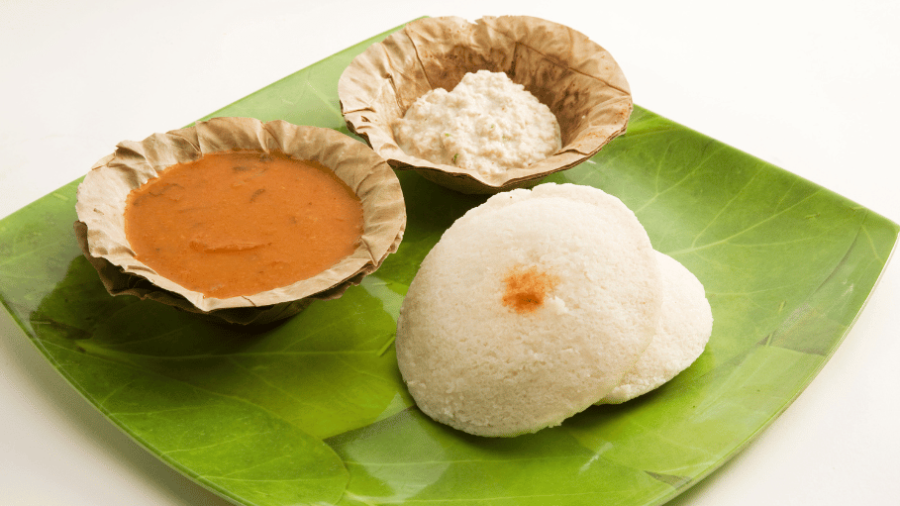“Idli Sambar – A Tasty South Indian Breakfast”
Introduction
Idli Sambar is a quintessential South Indian breakfast dish that’s loved not only in India but also enjoyed by people worldwide. Soft and fluffy idlis served with a flavorful and aromatic sambar, this dish is not just delicious but also nutritious. In this blog, we’ll guide you through the process of making perfect Idli Sambar at home.

Ingredients
For Idli:
- 1 cup idli rice
- 1/2 cup urad dal (split black gram)
- 1/4 cup poha (flattened rice)
- Salt to taste
- Water for soaking and grinding
- Oil or ghee for greasing idli molds
For Sambar:
- 1 cup toor dal (split pigeon peas)
- 1 small lemon-sized tamarind ball
- 2 cups mixed vegetables (carrots, beans, eggplant, pumpkin, etc.), chopped
- 1 medium-sized onion, finely chopped
- 2-3 ripe tomatoes, chopped
- 2-3 green chilies, slit
- 1/2 teaspoon turmeric powder
- 1 teaspoon red chili powder (adjust to taste)
- 2 teaspoons sambar powder
- A pinch of asafoetida (hing)
- Salt to taste
- 2 tablespoons oil
- 1/2 teaspoon mustard seeds
- 1/2 teaspoon cumin seeds
- A few curry leaves
- 2-3 dry red chilies
- 1/2 teaspoon fenugreek seeds (methi)
- 2-3 cloves of garlic, minced (optional)
- Chopped coriander leaves for garnish
Instructions
Making Idli:
- Wash and Soak: Wash the idli rice and urad dal separately and soak them in enough water for at least 4 hours. Also, soak the poha for about 30 minutes before grinding.
- Drain and Grind: Drain the soaked rice, urad dal, and poha. Grind them separately to a smooth paste using minimal water. Combine the ground rice and urad dal mixture, add salt, and mix well. Allow the batter to ferment overnight or for at least 8 hours in a warm place.
- Prepare Idlis: Grease the idli molds with oil or ghee. Pour a ladleful of the fermented batter into each mold. Steam the idlis in an idli steamer for about 10-12 minutes or until they are cooked through. Insert a toothpick or knife into an idli, and if it comes out clean, they are done.
- Serve: Remove the idlis from the molds using a spoon. Your soft and fluffy idlis are ready to be served.
Making Sambar:
- Cook Toor Dal: Pressure cook the toor dal with enough water until it’s soft and mushy. Mash it well and set it aside.
- Tamarind Extract: Soak the tamarind ball in warm water for about 15 minutes. Squeeze out the tamarind pulp and discard the solids.
- Cook Vegetables: In a separate pot, cook the chopped vegetables with turmeric powder, salt, and enough water until they are tender.
- Prepare Sambar Base: In a large pan, heat oil and add mustard seeds. Once they splutter, add cumin seeds, dry red chilies, fenugreek seeds, and curry leaves. Sauté until the spices release their aroma.
- Add Onions: Add finely chopped onions and green chilies. Sauté until the onions turn translucent.
- Add Tomatoes: Add the chopped tomatoes and cook until they become soft and mushy.
- Spices: Add red chili powder, sambar powder, and a pinch of asafoetida. Sauté for a couple of minutes.
- Tamarind Paste: Pour in the tamarind extract and bring it to a boil. Let it simmer for 5-7 minutes until the raw smell of tamarind disappears.
- Add Dal: Add the mashed toor dal and cooked vegetables along with their water. Adjust the consistency by adding more water if needed. Simmer for 10-15 minutes, allowing the flavors to meld.
- Seasoning: In a separate small pan, heat some oil and add mustard seeds, cumin seeds, and minced garlic (optional). Once they splutter, pour this seasoning over the sambar.
- Garnish: Garnish the sambar with chopped coriander leaves.
Serving
Serve your homemade Idli Sambar hot. Idlis are traditionally served with sambar and coconut chutney for a complete South Indian breakfast experience. Enjoy the soft idlis soaked in flavorful sambar, and savor the authentic taste of South India!


